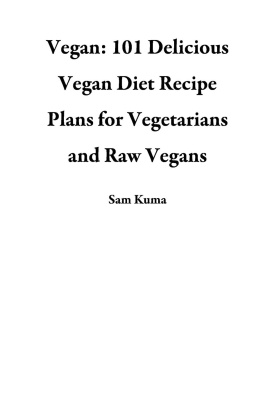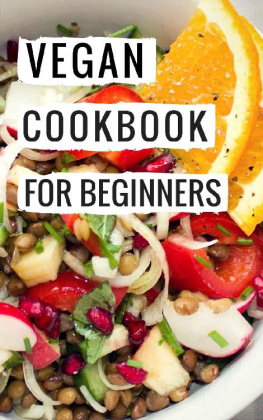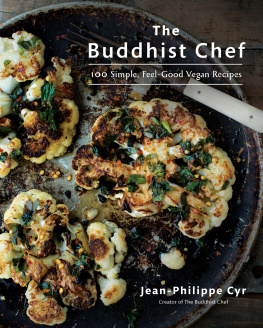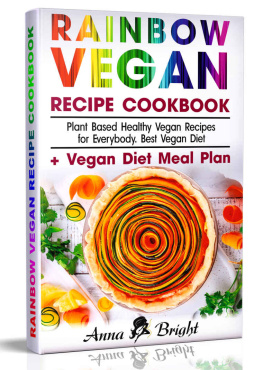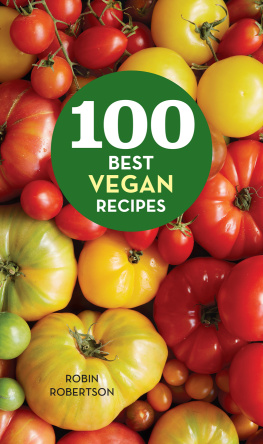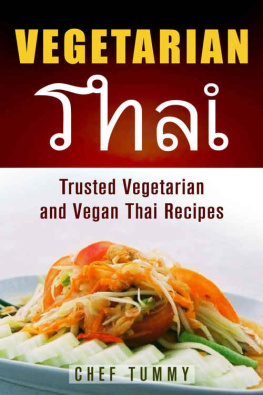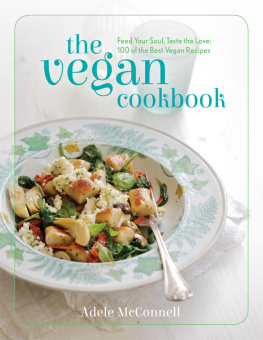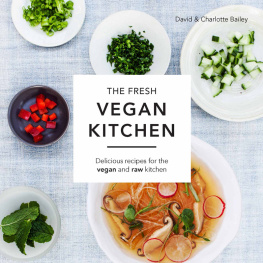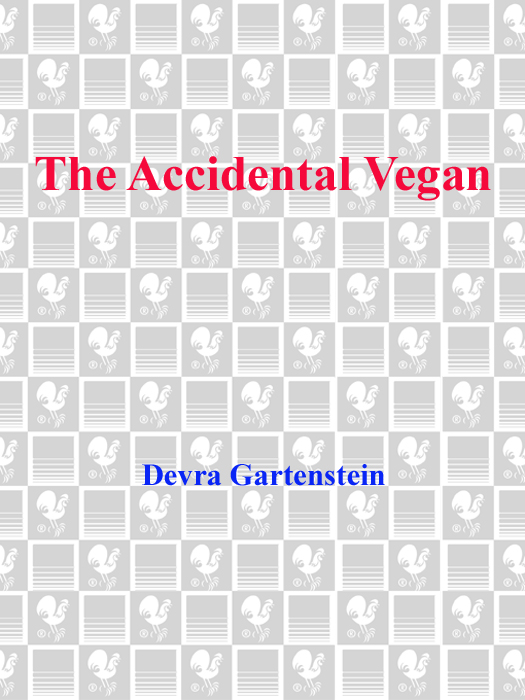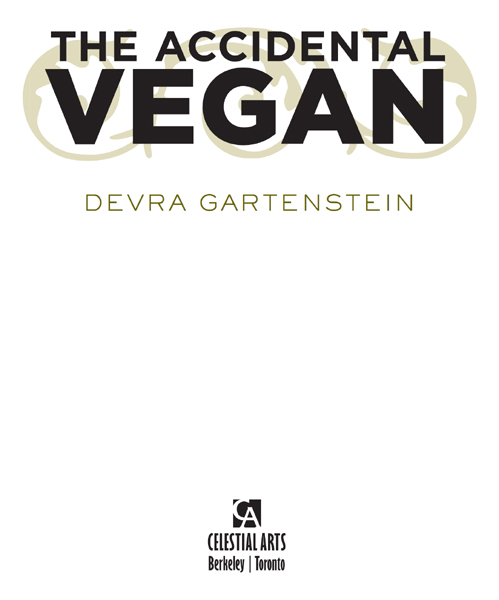Text copyright 2009, 2000 by Devra Gartenstein
All rights reserved. No part of this book may be reproduced in any form, except brief excerpts for the purpose of review, without written permission of the publisher.

Celestial Arts
an imprint of Ten Speed Press
PO Box 7123
Berkeley, California 94707
www.tenspeed.com
Distributed in Australia by Simon and Schuster Australia, in Canada by Ten Speed Press Canada, in New Zealand by Southern Publishers Group, in South Africa by Real Books, and in the United Kingdom and Europe by Publishers Group UK.
Food styling for bottom front cover photo by Kim Konecny
Prop styling for bottom front cover photo by Christine Wolheim
Previously published by Crossing Press, 2000.
Library of Congress Cataloging-in-Publication Data
Gartenstein, Devra.
The accidental vegan / Devra Gartenstein.
p. cm.
An update of a well-loved vegan cookbook filled with simple recipes that will appeal to a wide range of health-minded home cooksProvided by publisher.
eISBN: 978-0-307-78579-4
1. Vegan cookery. 2. Cookery, International. I. Title.
TX837.G322 2009
641.5636dc22
2008033601
v3.1
For Cintia
CONTENTS
PREFACE
I get mixed reactions to the title of this book. Some people say, Thats me! Others seem offended at the suggestion that there could be anything accidental about choosing a vegan diet. I wasnt a vegan when I first wrote most of these recipes and Im not a vegan now, although lately Ive been avoiding most animal products in order to keep my cholesterol level down. Ive read reviews holding that someone who isnt strictly vegan has no place writing a vegan cookbook. I disagree!
There are so many good reasons for us to collectively eat less meat and dairy. My personal health concerns have shown me firsthand that it makes sense to limit consumption of animal products. There are environmental and humanitarian reasons as well. A United Nations report early in 2007 fingered livestock as the single largest source of greenhouse gases, contributing more toward global warming than even transportation.
Rising food costs all over the globe can be traced in part to rising standards of living in formerly poor countries, increasing the demand for meat, which exacts a heavy toll on the planets resources in comparison to plant-based foods. Too much land is being used to grow feed for livestock rather than food for humans, and as a result, there isnt enough food to go around.
My current business includes a farmers market concession serving vegetarian dishes based on local, seasonal ingredients. Nearly every day I hear someone commenting, Smells wonderful, but Im not a vegetarian. I tell them that you dont have to be vegetarian or vegan to eat vegetarian or vegan food, just like you dont have to be Thai to eat Thai food, but theyre not convinced. I want to find a way to reach these people, to encourage them not to automatically reject this cuisine just because it doesnt happen to have meat. I doubt that any of them includes meat in every single one of their meals, even those who proudly proclaim, Im a carnivore! Toast and coffee is a vegetarian meal, and so are pancakes, waffles, and many mainstream soups.
Ive come to believe that much of the resistance I encounter toward vegetarian and vegan food runs much deeper than the meal currently at hand. Meat has always been a special food for humans, from the times of Paleolithic hunters and ancient religious sacrifices to the modern-day Thanksgiving turkey tradition. Its no accident that the biblical tale recounts a divine preference for Abels meat over Cains vegetables (and its equally telling that Cain, the farmer, is the survivor). These ancient stories speak of a bias or preference that is still largely with us, despite the fact that so much of the contemporary meat supply is mass-produced, diseased, and dirty.
Despite our long history of viewing meat as special, it really shouldnt be so hard to market meatless meals. Tasty food is tasty food, regardless of whats in it or not in it. Some of the resistance I encounter can no doubt be traced back to the bland, austere fodder that characterized the early natural foods movement, when health invariably trumped flavor and even salt, vinegar, and spices were suspect. Unfortunately, these stereotypes have persisted even as vegetarian and vegan food has come into its own as a vibrant cuisine during the past thirty years or so.
Another reason for the persistent negative image of the vegetarian and vegan movements may be the evangelical tone of so much of the outreach. The very terms vegetarian and vegan describe a diet completely free of meat products or animal products, respectively. Despite all of the excellent reasons to eat this way, only a small percentage of people have taken the step of completely renouncing these foods. Perhaps a piecemeal approach would be more effective, at least for some. After all, every meal that doesnt include meat lessens the demand for it and the toll it takes on our planet, regardless of whether or not the person eating it is a strict vegetarian or vegan.
The purpose of this book is not to convert anyone to a strictly vegan diet, although Id certainly be happy to see more people eating this way. Instead, Im hoping that more of us can learn to prepare a range of foods that are healthy and sustainable without necessarily thinking in those all-or-nothing terms, which can get in the way of taking smaller steps on a daily basis.
Many of the recipes in this book come from culinary traditions other than the Anglo-American style, which evolved in the context of a powerful cattle industry and wide-open spaces for grazing. The foods we find in other parts of the world tend to use meat sparingly because the real cost of producing animal products hasnt been obscured by an infrastructure geared toward producing these foods cheaply. The Western meat-based social and economic bias hides expenses such as environmental degradation, destruction of indigenous traditions, and rampant health problems. We have a great deal to learn from those societies that havent had the luxury of this widespread denial.
Virtually every culture in the world has evolved a language of food as a way to create order and meaning out of its own unique ecological niche. The cuisine of a people expresses its values and its personality, its ingenuity and its quirks. As we grapple with the limitations of the Western cultural model, the foods and flavors of other regions can guide us in building a new relationship with our own landscape, one that helps the land regenerate and gives each of us some of the tools we need to restore our personal health.
The world of sustainable food and healthy eating sometimes feels like a vast minefield. No sooner do we learn that a certain food, such as fat, is bad for us than we start hearing that it may not be that harmful after all. Meat contains cholesterol and saturated fat, but grass-fed beef may have much less. Vegetarian and vegan eating can lessen the risk of heart disease and some cancers, but vegan diets can be deficient in vitamin B12, an essential nutrient. Organic food is better for the environment, but less so when its shipped from far away.
It can be especially difficult to make consistently good choices because we eat several times a day and there arent always good options to be found wherever we happen to find ourselves when were hungry. To make matters worse, the advertising industry latches onto each new study, and huge food conglomerates are quick to introduce products that exploit the kernel of truth in every fresh discovery. Its enough to make anyone feel cynical or discouraged.


